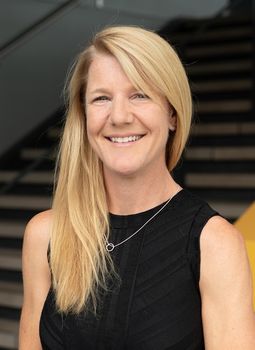Goal: Create one of the best entrepreneurial support programs
- UdeMNouvelles
09/16/2022
The newly minted Millénium Québecor team is working to create a distinctive entrepreneurship support program.
All the pieces are coming together at the University of Montreal (UdeM) to drive the Millénium Québecor entrepreneurship support program forward. Half of the $40 million that Quebecor and the Fondation Chopin-Péladeau donated to UdeM in February has been earmarked for the program. The other half will go to construction of the Innovation Centre, where the program will be housed.
Millénium Québecor will support entrepreneurship in UdeM’s student community and its pool of graduates, faculty and professionals. It may also support projects from outside the university.
The program will have three main components. The first is awareness-raising: “We want to ignite the entrepreneurial flame that we know is already glimmering in many people,” said Marie-Claude Lemire, senior director of the Innovation Centre and Millénium Québecor.
That is borne out by the results of a student straw poll conducted in March, which were shared at the program kick-off meeting on May 20: 46% of respondents had their sights set on starting a business. That number may not be representative, as the sample consisted of people with an interest in entrepreneurship, but previous surveys conducted in 2019 and 2020 found that 25% to 30% of UdeM’s entire student body had entrepreneurial ambitions.
“It is natural for young people to want to unite different types of expertise and create something, become their own boss, work towards a better future,” Lemire observed. “We have to empower this generation to turn their projects into reality.”
The entrepreneurship awareness component will also reach beyond the student community. “Business opportunities abound around research projects, but not all researchers have the tools and partners to commercialize their results,” said Lemire. “So connecting research teams with people who have entrepreneurial abilities is also very important in order to realize maximum benefits from their work.”
Training and support
Secondly, Millénium Québecor will offer credit and non-credit courses to develop the entrepreneurial skills and knowledge needed to bring projects to fruition.
Thirdly, there will be a support component, including a business incubator and an accelerator.
“At the Entrepreneurship Centre, we already have cohorts, coaching and mentoring,” said Lemire. “However, the services currently available are not sufficient to support everyone who wants to start a business. Millénium will strengthen and expand the support component. Among other things, a business start-up fund will be established.”
All stages of entrepreneurship will therefore be supported. “We want to become a one-stop shop offering a full complement of services for people who want to start a business,” Lemire explained. “And we want the spirit of enterprise to so permeate the campus that, for example, UdeM personnel will develop an intrapreneurial attitude in their work. We need to nurture the ability to see things through an entrepreneurial lens on a daily basis.”
Know the needs
To develop services that meet the real needs on the ground, UdeM is listening. At the kick-off meeting on May 20, a panel of four people with experience in entrepreneurship was assembled for the purpose. It included UdeM Chancellor Frantz Saintellemy, who has a series of patents, innovations and start-ups to his credit and co-founded the incubator Groupe 3737; Alain Bélanger, Chair of the Board of the UdeM Entrepreneurship Centre and CEO of Verdant Environmental Technologies; Geneviève Desautels, Director General of Éduc’alcool, founder of Intelligence illuxi and founder of Amplio Stratégie; and Alexia Bhéreur-Lagounaris, founder of AblBlaLab.
They discussed the challenges along the entrepreneurial path, which are in many ways similar to those faced by researchers. One takeaway from the discussion was that the two fields require overlapping skill sets: creativity, resilience, the ability to persuade, the ability to work independently and as part of a team, and management and communication skills are important in both.
To delve deeper, the Millénium Québecor team will survey with the faculties in the fall to learn more about their needs. “We will build the program based on the responses and make sure our services are tailored to the various audiences,” Lemire promised.
A call will also be put out to all experts interested in supporting the development of the Millénium Québecor program in order to create a bank of specialists.
Entrepreneurial self-assessment
UdeM already has solid foundations on which Millénium Québecor can build its program and its vision.
HEInnovate, a self-assessment tool from the Organization for Economic Cooperation and Development (OECD), is one way for institutions of higher education to determine where they stand in terms of entrepreneurial services. “We’ve only begun the analysis but the process has already shown that UdeM possesses many of the essential elements of a culture of entrepreneurship and innovation,” said Lemire. “For example, the Rector and the entire administration are very enthusiastic about entrepreneurship and believe it merits more support. The funding that is already in place will enable us to carry out important initiatives and maintain them in the long term.”














